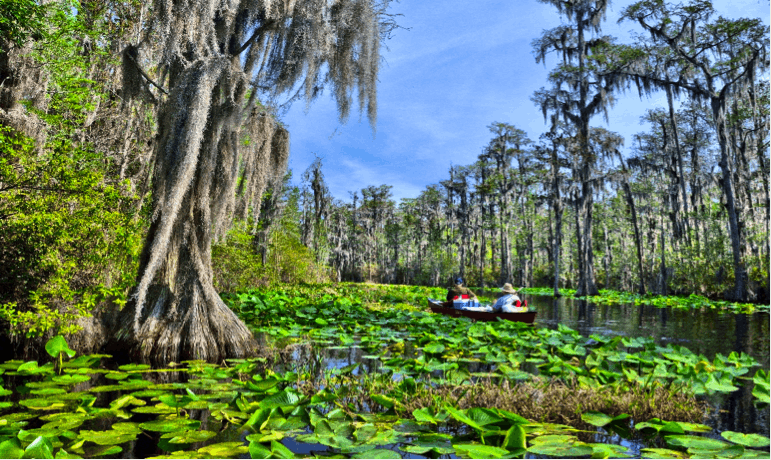Tweet“Secretary Haaland has embraced the best available science and acknowledged the extensive research and tireless advocacy of dozens of scientists, elected officials, and agency leaders who are unequivocal about the significant threat facing the Okefenokee National Wildlife Refuge. Digging near Okefenokee, or any wetland, is reckless and wrong-headed, period. Allowing any mining in the vicinity of Okefenokee could lead to a catastrophic draining of the swamp which would irreparably transform it from the vibrant and biodiverse wilderness we know today. We thank Secretary Haaland for highlighting the peril facing this iconic and irreplaceable blackwater wetland and encourage Governor Kemp to reject all permits for this project. Mining has absolutely no place next door to this extraordinary American treasure.“
-Jamie Rappaport Clark, President and CEO of Defenders of Wildlife.
Defenders of Wildlife applauds recent comments submitted directly to Georgia Governor Brian Kemp by U.S. Secretary of the Interior Debra Haaland that reinforce the dangers of mining operations near the Okefenokee Swamp. Twin Pines Minerals, an Alabama-based company, has been seeking permission to dig up nearly 6,000 football fields worth of land adjacent to Okefenokee, North America’s largest blackwater swamp.
“Secretary Haaland has embraced the best available science and acknowledged the extensive research and tireless advocacy of dozens of scientists, elected officials, and agency leaders who are unequivocal about the significant threat facing the Okefenokee National Wildlife Refuge,” said, Jamie Rappaport Clark, Former president and CEO of Defenders of Wildlife. “Digging near Okefenokee, or any wetland, is reckless and wrong-headed, period. Allowing any mining in the vicinity of Okefenokee could lead to a catastrophic draining of the swamp which would irreparably transform it from the vibrant and biodiverse wilderness we know today. We thank Secretary Haaland for highlighting the peril facing this iconic and irreplaceable blackwater wetland and encourage Governor Kemp to reject all permits for this project. Mining has absolutely no place next door to this extraordinary American treasure.“
The Twin Pines strip mine would eventually destroy nearly 8,000 acres of land within 400 feet of Okefenokee, including the unique soil profile of the Trail Ridge, and the pumping of groundwater from the swamp’s edge could drastically undermine the Okefenokee’s ability to sustain itself, according to the U.S. Fish and Wildlife Service. For the alligators, salamanders and wading birds—such as the threatened wood stork—which depend on predictable, seasonal fluctuations in water levels, the results could be catastrophic.
Background:
- The Okefenokee National Wildlife Refuge is a vital natural resource in Georgia and the largest refuge east of the Mississippi. At roughly half a million acres, the Okefenokee is one of the largest intact freshwater ecosystems in the world and home to various threatened and endangered species. The refuge also contains more than 350,000 acres of congressionally designated wilderness that supports hundreds of species of plants and animals, including the imperiled red-cockaded woodpecker and eastern indigo snake.
- Of the nearly 600 refuges in the National Wildlife Refuge System, the Okefenokee is in the top ten for economic output, generating $64 million per year for local communities, and supporting over 750 jobs.
- The Twin Pines proposal has provoked a significant outcry. In 2021, a bipartisan group of Georgia and former federal officials signed an open letter criticizing the project in the Atlanta Journal-Constitution. In all, over 100,000 people have signed comments at the state and federal level urging the government to save the Okefenokee.
- In 2020, Twin Pines Minerals took advantage of a Trump administration rollback--the Waters of the United States replacement rule—which removed federal oversight from the project. A federal judge eventually struck down the rule changes in August 2021.
- On June 3, the Army Corps of Engineers announced that it vacated the jurisdictional determination for the project, following the notification that the Corps had not fully consulted with or considered the wetland’s cultural and historical significance to the Muscogee (Creek) Nation. Shortly thereafter, the Corps settled with Twin Pines Minerals and agreed to reinstate the jurisdictional determinations issued under the Trump framework.
For over 75 years, Defenders of Wildlife has remained dedicated to protecting all native animals and plants in their natural communities. With a nationwide network of nearly 2.1 million members and supporters, Defenders of Wildlife is a leading advocate for innovative solutions to safeguard our wildlife for generations to come. To learn more, please visit https://defenders.org/newsroom or follow us on X @Defenders.
Media Contact
News

Study Led by Defenders of Wildlife Scientist Shows Noise Pollution Impacts on Migratory Birds



